Person Centred Theory: Flourishing and the Sociological Habitat
This article explores several interrelated themes centered around the concept of ‘person-centered’ theory and its application in various societal contexts, particularly within modern Britain. Through an exploration of key themes it argues for a comprehensive, systems-oriented view of person-centered practices, emphasizing the need for genuine engagement, recognition, and understanding of the complex contexts in which individuals exist to promote health and well-being.
Table of Contents
Introduction

The idea of ‘person centred’ theory and practice has become popular and well rehearsed in multiple contexts of modern Britain. As an idea it is often found embedded in policy documents and presentations when speaking about collective endeavours, particularly in the public and third sectors.
Language gets changed over time and new ideas come into circulation with the intention usually of positive change. Person-centred-ness needs a nuanced critique as it too often gets trotted out whilst preserving the configuration of the institution at the centre of interests. We need to be honest where the talk of person-centred practice is but the walk of organisation-centred practice is done.
This is exemplified by the longitudinal work of Prof Lesley McAra and Susan McVie in the field of Penology, who said: “What we have found in our study is that no matter what the policy, the overarching policy – the government policy changes from time to time – (we have had 3 different phases of policy over the last thirty years) no matter what that policy is, the decision making practices are the same. There is a disjuncture between policy, and actually what happens on a day to day level.”
The distance between words and actions is counted in lives. I am not suggesting that the theory and/or policies which are drawn together are not trying to do good work, more, that I am pointing out that increasingly in this epoch we need to develop the skill of paying attention to what people do to understand the value of the words which people/organisations state. With this in mind the following article is an exploration of some of the roots of ‘person-centered’ perspectives with a particular interest of setting these into a systems approach consonant with human development.
Person Centred Theory: Flourishing and the Sociological Habitat
In this essay I explore notions of person-centred theory in relation to everyday society and wellbeing as my context. I notionalise the idea of the sociological habitat (Dunedin 2019) as constituting those things derived from the environment which contribute to the flourishing of the organism.
References:
Dunedin, A. (2019) Education as Human Development. [online] Ragged University. Available at: https://raggeduniversity.co.uk/2019/05/03/education-as-human-development/.
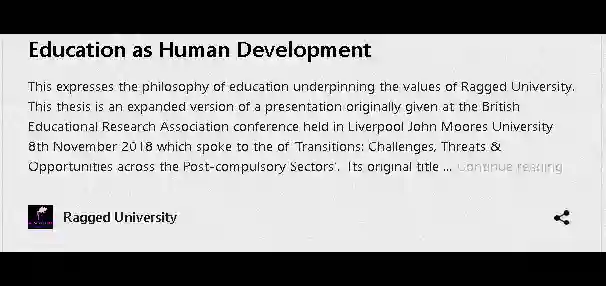
My interests are to place the human at the center of society exploring the social determinants of health and how absence of these might produce ailments. To this end I draw on systems perspectives in order to build up a complex understanding of the sentient being and the needs which are met through distinct elements of the constituted environment.
The work of Urie Bronfenbrenner (1979) speaks directly to notions of Human Development. I shall explore some of the key ideas in his work and also thinkers from varying disciplinary subjects which help me produce a deeper sense of an ecological systems theory that accounts for aspects of Human Development as pertaining to flourishing. Significant authors include Carl Rogers (1995), Harry Burns (2014), Aaron Antonovsky (1979) and Emile Durkheim (1897).
References:
Bronfenbrenner, U. (1979). The Ecology of Human development: Experiments by Nature and design. Harvard University Press. Page xiv and 56
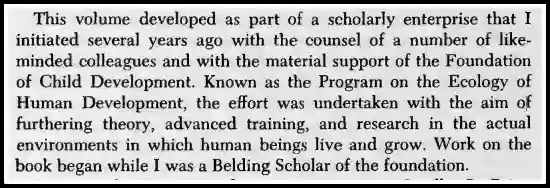

Click to download introduction and part one
Rogers, C. (1995) A Why of Being. Boston: Houghton Mifflin Co. Page 118

Click to download introduction and chapter one
Burns, H., (2014) What Causes Wellness. TEDxGlasgow. Available at: https://www.youtube.com/watch?v=yEh3JG74C6s.
Antonovsky, A., (1979) Health, stress, and coping. San Francisco: Jossey-Bass Publ. Page 85
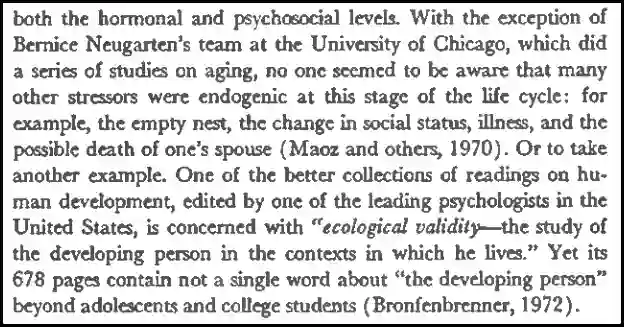
Durkheim, E. (1897) Suicide: a Study in Sociology. Routledge.
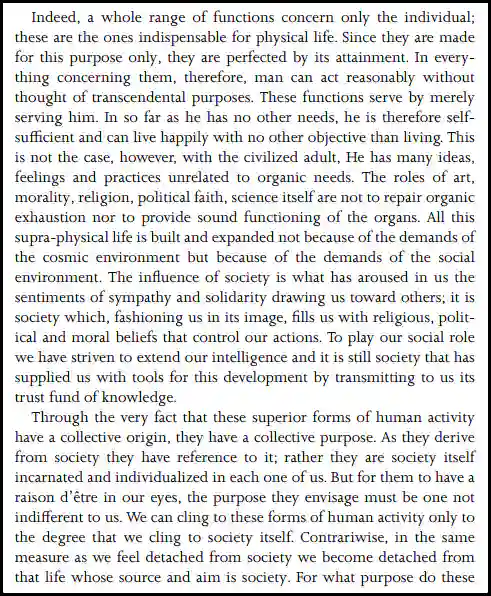
I will sketching out an ecology of factors involved in thriving which necessitates the contemplation of an alchemical ‘gestalt’ which life speaks to. The term gestalt translates as “Whole” or “configuration” and came to be associated with a school of psychology and theory of perception which recognized that an organized entity was more than simply the sum of all its parts (Freedheim & Weiner 2013).
References:
Freedheim, D. K., and Weiner, I.B. (2013) History of psychology. New York: Wiley, Cop. page 17

Such an ecological approach must necessarily lead us wherever life permeates. In building such understandings the thinker must be prepared to breach boundaries artificially laid out in silos. These boundaries arise through the human propensities to neatly administrate collected stores of knowledge arranged in books on different shelves, in divided buildings, in sequences only logical to the culture of the specialist.
Whilst a great treasure, disciplinary knowledge can also be a bounded trap which has the possibility of theoretically erasing living realities through obliteration of context. By this I allude to the problems of selective attention which cause to be obscured other parts of a greater whole imperative to understand the constituent in focus. In sociological terms, to eclipse that context is to eclipse a part of ourselves and the possibility of relating to others.
In the space available there is not the possibility of offering comprehensiveness so the essay functions more as a sketch exploring key ideas in this field of study and how they might offer accounts of wellbeing and its absence in the context of citizenship.
Just as we are capable of imagining ourselves as separate from and different to the world outside our lens of perspective, the truth is that we are tangled and of the same self as the living world – in this way I suggest that ‘out there’ is also the ‘in here’. The myths we tell ourselves structure the representations of the world we make and by not understanding how we are connected we risk becoming estranged from our authentic selves. We are tangled just as knowledge is.
To imagine that biology is not physics, or that chemistry is not psychology makes as much sense as to say the carpenter is not the philosopher (Omogunwa 2018) or the lover is not the tyrant. So in the story of understanding Human Development I suggest we must be uncertain enough to be honestly changed by the journey that necessarily involves accepting our own death as we are reborn in that very moment anew at the end of history (Gunn & Wilding 2020, p.12).
References:
Omogunwa, I.J. (2018) The Carpenter as a Philosopher Artist: a Critique of Plato’s Theory of Mimesis. Philosophy Pathways 222 (1).
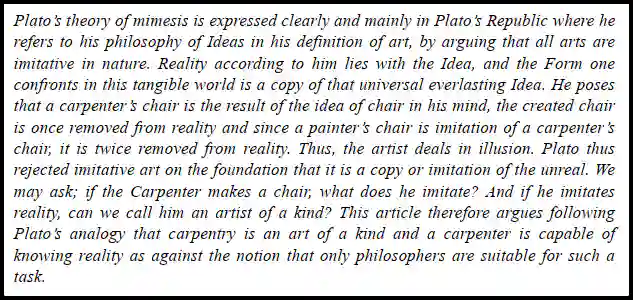
Gunn, R. and Wilding, A. (2020) Revolutionary Recognition. Bloomsbury Publishing. Page 12

In summary, in this essay I try to utilise person-centered theory to locate the person as always rooted/tangled in a living ecology and illustrate that being a part in a living ecology is a vital resource contributing to wellbeing. The living ecology can be understood as a part of ‘the person’, and ‘the person’ as a part of the ecology identifying the mutually recognitive relationship as central to health and wellbeing through its ability to offer meaning. In the next section I will be turning to the person-centered work of Carl Rogers in order to examine the core dynamics of the mutually recognitive relationship.
Reflection and Mutual Recognition as Sociological Habitat
I start by reviewing the thinking of Carl Rogers (1995), the psychologist recognized for developing person centred perspectives in psychology. In particular I am interested in his expounding on what I call here the ‘appreciative recognitive dynamics‘ that underpin better communication, expression and relations.
References:
Rogers, C. (1995) A Why of Being. Boston: Houghton Mifflin Co. Page 22

Carl Rogers suggested that, if you can set up the facilitative context appropriately, then people naturally want to grow (Edge, 2024). Facilitating that natural urge people have for self development Rogers suggests is an important part of a therapeutic growth dynamic which is more related to providing space for individuals to express themselves in a dialogical relationship than a setting where someone is instructed.
References:
Edge, J. (2025) Julian Edge: An Interview With An Educator, [online] YouTube. Available at: https://www.youtube.com/watch?v=qoC2fs7R59U [Accessed 19 Dec 2024].
What Rogers sets up as the core conditions of facilitation I suggest as articulating key aspects of the sociological habitat of human development. These involve non-judgment and empathy, reflection and clarification, congruence and honesty, building understandings and the importance of expressing thoughts.
Vital amongst these is the power of reflection both as a means of acknowledgment and as a means of clarification. It is a way of being in a relationship with another person which makes explicit a process of mutual recognition. It is through the mutually recognitive dynamic that Gunn & Wilding (2020 p.138) suggest emancipation can be reached and that social relations can be understood “as relations of recognition– whether contradictory or non-contradictory “ in a society (Ibid. p.40) .
References:
Gunn, R. and Wilding, A. (2020) Revolutionary Recognition. Bloomsbury Publishing. Page 138 and 40
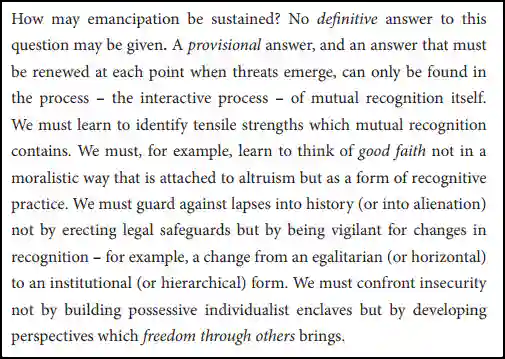
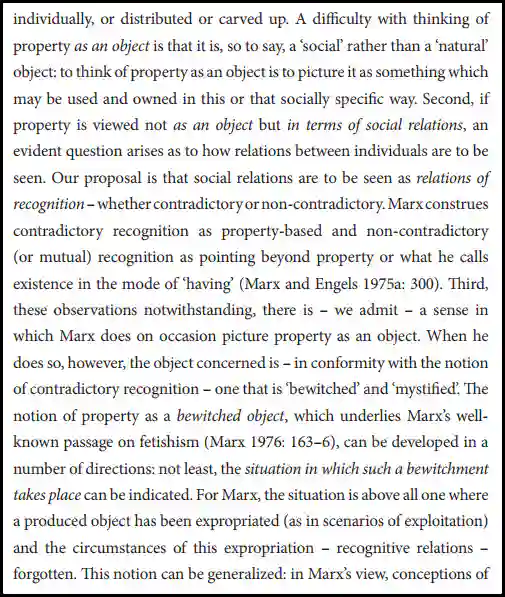
It is this appreciative dynamic which is at the heart of relationships and is a key aspect necessary for the development of the living being. This I suggest forms the foundation of the sociological habitat and also offers an account of the integral fabric of mind which takes us beyond our own perspective producing growth into new horizons. Everyday existential maintenance of life may be understood via “Being in Relation with Other” forming the fabric of society as “companionship” (Dunedin 2019).
References:
Dunedin, A. (2019) Education as Human Development. [online] Ragged University. Available at: https://raggeduniversity.co.uk/2019/05/03/education-as-human-development/. Page 59
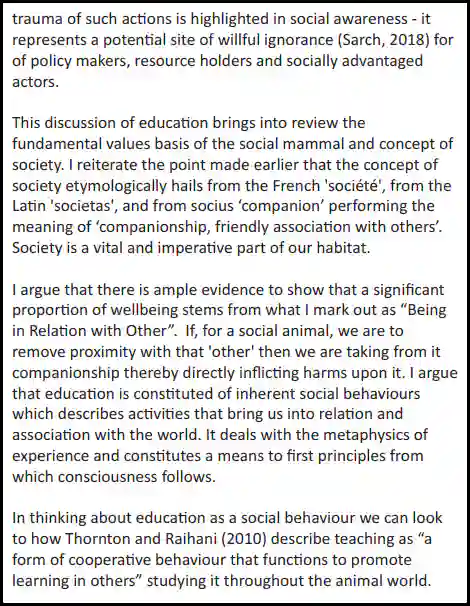
The Habitat as Developed in an Ecology
Bronfenbrenner’s Ecological Systems Theory offers a rich framework for analysing the conditions for Human Development (Bronfenbrenner & Mahoney 1975). Bronfenbrenner’s large catalogue of work in developmental psychology led him to bring together a range of perspectives to produce an interdisciplinary study about how the biological, psychological and sociological factors for wellbeing (Crawford 2020) interact in an ecology to facilitate development.
References:
Bronfenbrenner, U., Mahoney, M.A. (1975) Influences on Human Development. Holt McDougal. Page ix
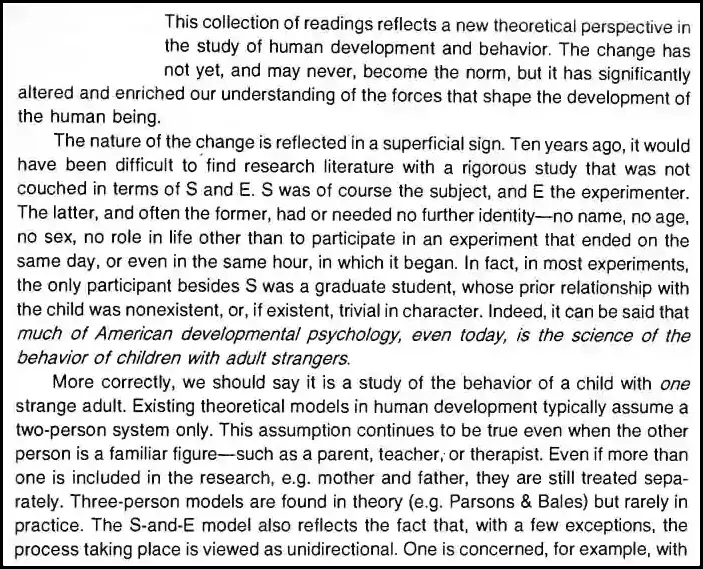
Click to download introduction and part one
Crawford, M. (2020) Ecological Systems theory: Exploring the development of the theoretical framework as conceived by Bronfenbrenner. J Pub Health Issue Pract 4(2):170. doi: https://doi.org/10.33790/jphip1100170.
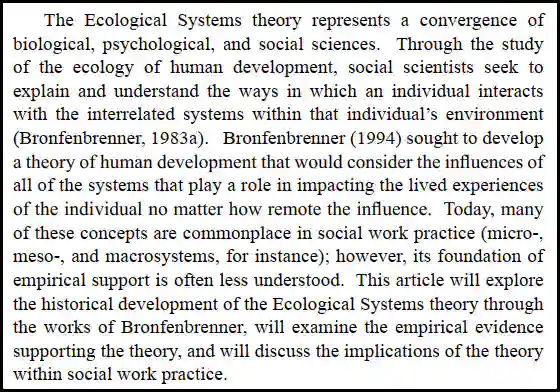
I find Bronfenbrenner’s accounts of his early life particularly relevant to this essay as it speaks to why and how he developed a systems perspective in developmental psychology that ranges its attentions from the micro to the macro (Shelton 2019). It offers insights into the circumstances that inspired him to think about how the human develops their characteristics in relation with their environment and how understanding the systems view offers better ways into apprehending anothers perspectives:
“It was my good fortune to have been brought up on the premises of a state institution for those who were then called ‘the feebleminded,’ where my father was a neuropathologist…he was a field naturalist at heart. The institution grounds offered a rich biological and social terrain for his observant eye. There were over three thousand acres of farmland, wooded hills, moss-covered forest…In those days the institution was a functioning community…I remember especially vividly his anguish when the New York City courts would commit to our institution, out of error or-more probably-sheer desperation, perfectly’ normal children. Before he could unwind the necessary red tape to have them released, it would be too late.” (Bronfenbrenner 1979).
References:
Shelton, L.G. (2019) The Bronfenbrenner primer: A guide to develecology. New York, NY: Routledge, An Imprint Of The Taylor & Francis Group.
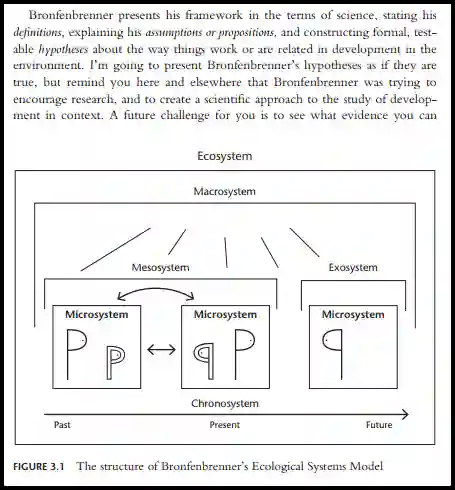
Click to download introduction and part one
Bronfenbrenner, U. (1979) The ecology of human development: experiments by nature and design. Cambridge: Harvard University Press.

In the above quotation Bronfenbrenner provides insights into his biological-psychological-sociological modeling of psychology which references a specific way of experiencing the world shaped by the affordances of his life in situ. This vignette gives us texture as to what ultimately shaped the systemic expression of the contributions he made to the field of Human Development. It offers humane texture to the theory he generated.
In his Ecological Systems theory he develops methodologies for mapping environmental interconnections between various factors in order to understand how the psychology of the individual is affected according with these. For example, we might pick up on the role that ‘red tape’ plays in psychological harms of someone who is a ward of the state or how having some purpose within a community may function in a therapeutic way.
His approach exemplifies a necessary interdisciplinary breaching of traditional subject boundaries in order to arrive at more complex, more representative models of theory which hold more explanatory power. The false dichotomies which are set up between disciplinary fields are often hinder advancing of understandings in the world, and this can be seen especially where psychiatry sets itself up in opposition to psychology, and where psychology sets itself against sociology, and so on.
The Causes Wellness and the Notion of Anomie
In this section I draw on Harry Burns’ (2025) provocation on ‘What Causes Wellness’ in order to surface notions of Salutogenesis which help us understand Person-Centred theory in relation to wellbeing. Salutogenesis is the study of the causes not just of health but beyond that, of wellbeing related to safety; this stands in contrast to the study of pathogenesis – the causes of disease. Burns cites the psychologist and sociologist, Corey Keyes (2002) on ‘flourishing as a cause of wellbeing’. Burns highlights “People who flourish are happy, satisfied; they see themselves as having a purpose…they have a degree of mastery, they have a sense of control over their lives”.
References:
Burns, H., (2025). What Causes Wellness by Harry Burns – Ragged University. Ragged University. https://raggeduniversity.co.uk/2025/02/17/what-causes-wellness-by-harry-burns/
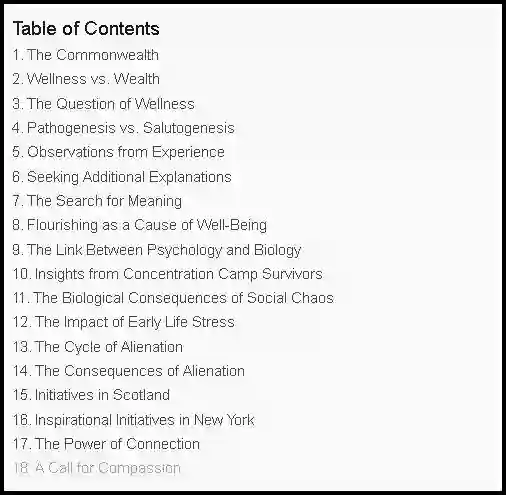
Click here for video and annotated transcript
Keyes, C.L.M. (2002) The Mental Health Continuum: From Languishing to Flourishing in Life. Journal of Health and Social Behavior, 43(2), pp. 207-222. doi: https://doi.org/10.2307/3090197.

Mittelmark and Bauer (2022) report on the introduction of the term ‘Salutogenesis’ by Aaron Antonovsky introduced in his 1979 book ‘Health, Stress and Coping’. They highlight that his starting point for this orientation of salutogenic study was the illness as consequences of psychosocial factors. Antonovsky (1979, p.10) is interested in the salutogenic question of what resources the organism requires in order to manage stress successfully, stating in the prologue to his book:
“What is common to all such resources is that they facilitate making sense out of the countless stimuli with which we are constantly bombarded. Such repeated experience generates a strong sense of coherence. This central concept of the book is defined as a global orientation that expresses the extent to which one has a pervasive, enduring though dynamic feeling of confidence that one’s internal and external environments are predictable and that there is a high probability that things will work out as well as can reasonably be expected.” (Antonovsky 1979, p.10)
References:
Mittelmark, M.B. and BAUER, G.F. (2022) ‘The Meanings of Salutogenesis’ in The Handbook of Salutogenesis. 2nd ed. Cham: Springer International Publishing, Imprint Springer. Page 3
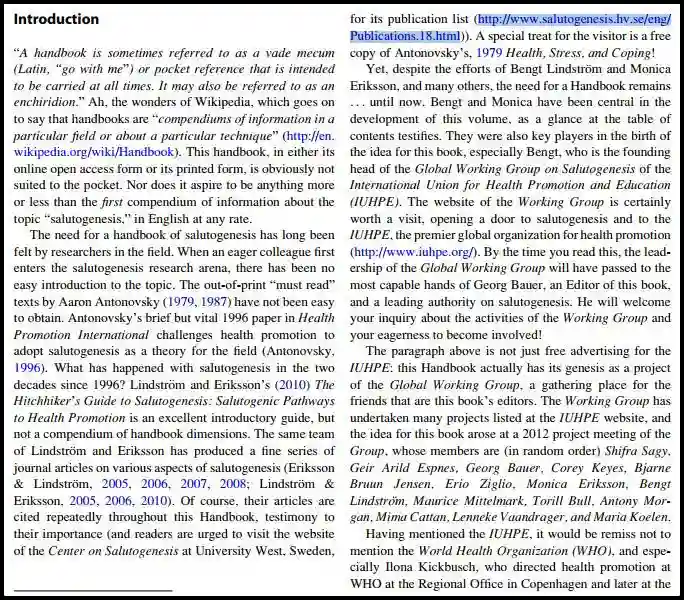
Click to download introduction and chapter one
Antonovsky, A. (1979) Health, stress, and coping. San Francisco: Jossey-Bass Publ. Page 10
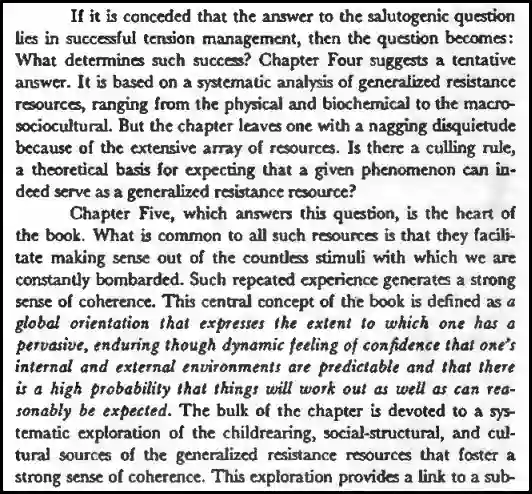
Building on the sense of salutogenesis in order to inform the notion of the sociological habitat as distinguished from the sociological environment by placing into context the importance of safety and stability for wellbeing. I link Burn’s thinking to Emile Durkheim’s introduction of the concept of ‘Anomie’ describing a chaotic and fractured break down of experience relating this to the breakdown of meaning in the lives of people. Combined with Norbert Elias’ analysis of anomie (Elias & Scotson 2008), I tie this back into the notions of safety, wellbeing and mitigating factors of toxic stress (Bhushan et al 2020) associated with salutogenesis.
References:
Elias, N. and Scotson, J. L. (2008) The Established and the Outsiders. University College Dublin Press. Page 177
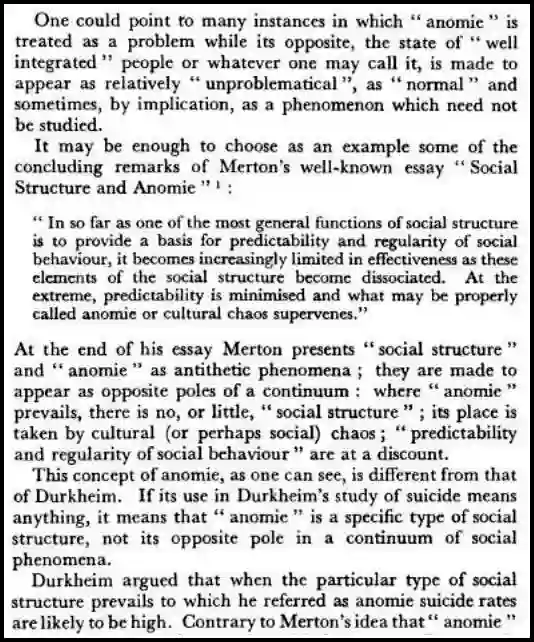
Bhushan, D., Kotz, K., Mccall, J., Wirtz, S., Gilgoff, R., Dube, S. R., Powers, C., Olson-Morgan, J., Galeste, M., Patterson, K., Harris, L., Mills, A., Bethell, C., And Burke Harris, N. (2020) Office Of The California Surgeon General. Roadmap For Resilience: The California Surgeon General’s Report On Adverse Childhood Experiences, Toxic Stress, And Health. Office Of The California Surgeon General. Doi: 10.48019/Peam8812. Available At: Https://Osg.Ca.Gov/2021/09/27/Roadmap-For-Resilience-California-Surgeon-Generals-Report/

A Critical Reflection on Current Context
It is in this context that a critical perspective is helpful to understand what is happening in terms of the sociological habitat and absence of the features needed for individuals to thrive. Returning to the work of Harry Burns, the theoretical perspectives I discuss have a grounding in contemporary Scotland and Britain more broadly and can lend valuable insight into the effects of alienation and poverty (JRF 2024; Dransfield 2014). The effects of exclusion from cultural participation through impoverished opportunity can be examined in a range of ways including social isolation and loneliness, lack of an enriched environment, boredom, diminishment of meaningful activity, social stigma, and knock-on effects of co-morbidity (Dunedin, 2019).
References:
JRF (2024) Uk Poverty 2024: The Essential Guide To Understanding Poverty In The Uk. Joseph Rowntree Foundation. Available At: Https://Unionsafety.Eu/Elibrary/Media/Elibrarymedia/Ukpoverty2024josephrowntreefoundation.Pdf.
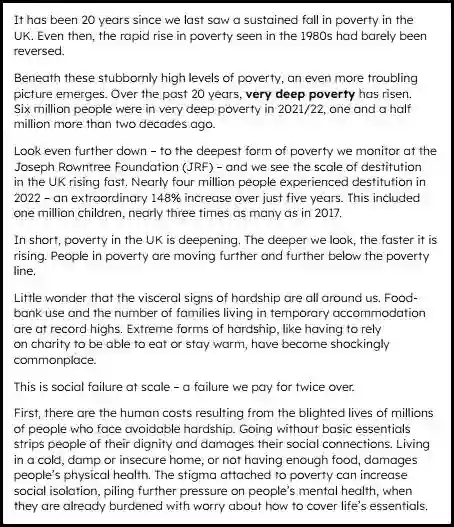
Dransfield, S. (2014) A Tale Of Two Britains: Inequality In The Uk. Oxfam Gb. Available At: Https://Policy-Practice.Oxfam.Org/Resources/A-Tale-Of-Two-Britains-Inequality-In-The-Uk-314152/.
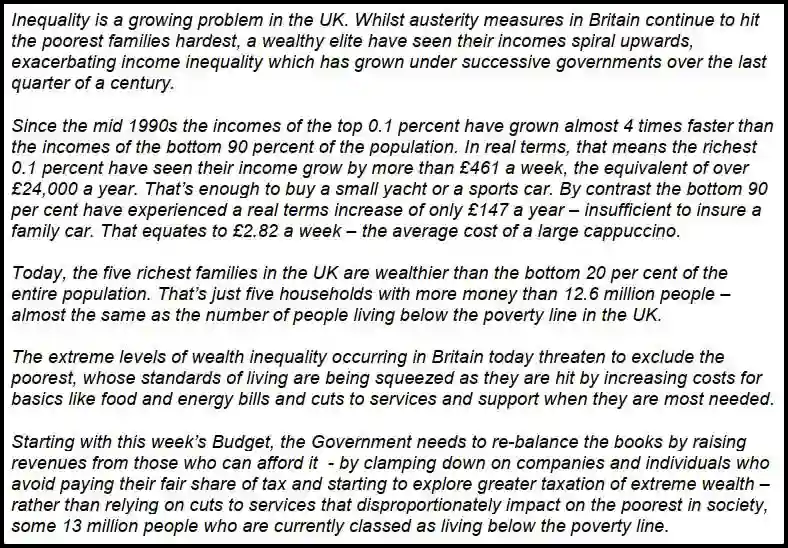
Dunedin, A. (2019) Education as Human Development. [online] Ragged University. Available at: https://raggeduniversity.co.uk/2019/05/03/education-as-human-development/. Page 58
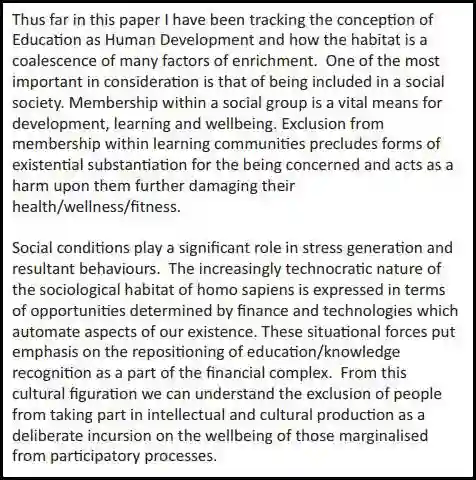
The impacts of alienation and poverty can be examined in terms of their physiological effects engendering a range of stress-related illnesses as well as priming individuals and communities for problem drug use, self harm and suicide. If people are separated from their sociological habitat their environment no longer provide the internal biological signals of natural reward associated with healthy social relations and meaningful activity. In the sociologically denuded landscape it seems rational to reason that people would seek out drugs of abuse as biochemical surrogates of natural reward (Di Chiara, Acquas, Tanda, & Cadoni, 1993).
References:
Di Chiara, G., Acquas, E., Tanda, G. And Cadoni, C. (1993) ‘Drugs Of Abuse: Biochemical Surrogates Of Specific Aspects Of Natural Reward?’ In Wonnacott, S. and Lunt, G. G. (Eds.) Neurochemistry Of Drug Dependence. London: Portland Press, Biochemical Society (Great Britain). Symposium Royal Free Hospital (London, England). Available at: https://books.google.co.uk/books/about/Neurochemistry_of_Drug_Dependence.html?id=MpJeAQAACAAJ&redir_esc=y. Page 65
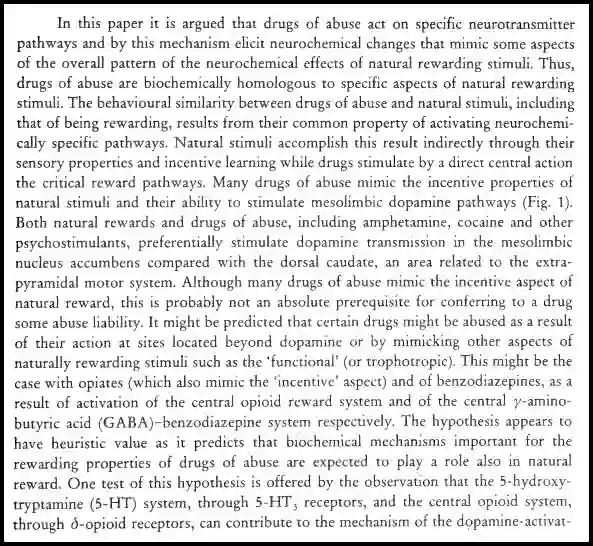
This kind of negative dynamic may be especially emphasised in the policy complexes of institutional settings that project the values of person-centred theory outward whilst exhibiting actions which centre the values of the market and most privileged in society. In many institutional settings what takes place is the appearance of consultation but where, in effect, dialogue is not taking place thus alienating the individual via pseudo-consultation.
Set into the terms of dehumanization scholar Ann Cahill (2011), such pseudo-consultation processes result in the harms associated with depersonalisation and instrumentalisation of the relationship by those in the advantaged institutional position. Cahill offers a scheme of thought that advances the field of dehumanization psychology by detailing situations where people are reduced to derivatives of a dominant agenda. This she calls the process of ‘derivatization’.
References:
Cahill, A. J. (2011) Overcoming Objectification: A Carnal Ethics. Routledge.

In effect, these are scenarios where individuals and communities are treated with humanised dignity so long as they speak/act to a prescribed agenda. In these situations it appears like those involved are listened to right up until the dialogue/activity shifts out of the policy makers consider acceptable at the time – known as the ‘Overton Window’.
This symbolically represents a failure of the conditions of appreciative dialogue which Carl Rogers sets at the heart of Person-Centred practice leaving people bereft of acknowledgment. This produces what Ken Doka (2002) describes as Disenfranchised Grief which results in toxic stress – stress which results in pathological outcomes (Bhushan et al 2020). This illusion of a relationship can represent a breakdown of meaning and produce in people deep feelings of helplessness to accompany with a sense of a hostile environment (Skaife & Martyn 2022). These thoughts offer some perspectives on aspects of culture which may be eroding salutogenic resources in the lives of people; in particular, the least advantaged in society with the fewest resources.
References:
Doka, K.J. (2002) Disenfranchised grief: new directions, challenges, and strategies for practice. Champaign, Ill.: Research Press. Page xiii
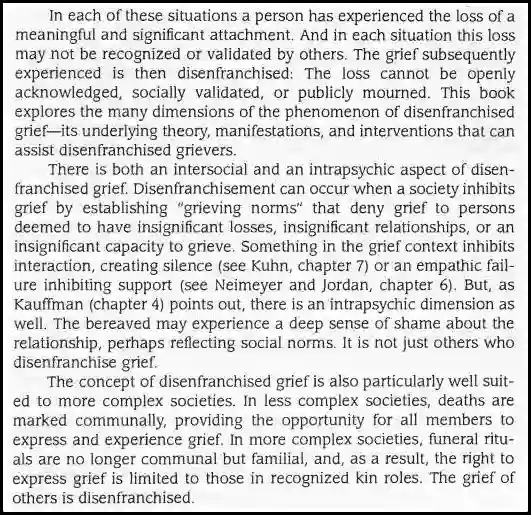
Click to download introduction and chapter one
BHUSHAN, D., KOTZ, K., MCCALL, J., WIRTZ, S., GILGOFF, R., DUBE, S. R., POWERS, C., OLSON-MORGAN, J., GALESTE, M., PATTERSON, K., HARRIS, L., MILLS, A., BETHELL, C., AND BURKE HARRIS, N. (2020) Office Of The California Surgeon General. Roadmap For Resilience: The California Surgeon General’s Report On Adverse Childhood Experiences, Toxic Stress, And Health. Office Of The California Surgeon General. Doi: 10.48019/Peam8812. Available At: Https://Osg.Ca.Gov/2021/09/27/Roadmap-For-Resilience-California-Surgeon-Generals-Report/

Skaife, S., Martyn, J. (2022) Art Psychotherapy Groups In The Hostile Environment Of Neoliberalism: Collusion Or Resistance? Routledge. Doi: 10.4324/9781003107408.
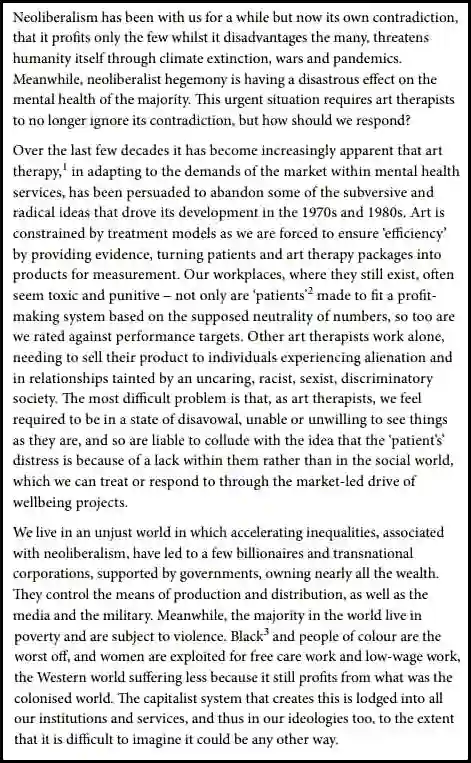
Conclusion
Here I explore person-centred theory within a framework of everyday society and wellbeing, introducing the concept of a “sociological habitat” as constituted of the environmental factors that contribute to human flourishing. Particular emphasis is placed on the individual in recognitive relationships as a part of the sociological habitat and as a major contributor to the social determinants of health.
Drawing on the work of Carl Rogers and Urie Bronfenbrenner, I frame person-centered practices within a ecological systems perspective that draws from multiple disciplinary perspectives including biological, psychological and sociological, in order to understand human development. This makes analysis from the salutogenic perspective rather than the pathogenic perspective, picking up on the psycho-social factors which generate ailment if absent from the sociological environment.
Integral to all this is the significance of mutual recognition in relationships, which if absent, can result in instrumentalisation and dehumanization of individuals. In this I offer some critiques of the current sociological landscape, particularly in terms of alienation and poverty, highlighting how that a lack of sociological habitat can lead to various health issues and social isolation. This underpins the necessity for authentic dialogue in institutional settings to prevent disenfranchisment and alienation. This viewpoint advocates for a holistic understanding of individuals within their ecological contexts to foster well-being.
Listed Bibliography of References:
Antonovsky, A. (1979). ‘Health, Stress, And Coping’. San Francisco: Jossey-Bass Publ.
Bhushan, D., Kotz, K., Mccall, J., Wirtz, S., Gilgoff, R., Dube, S. R., Powers, C., Olson-Morgan, J., Galeste, M., Patterson, K., Harris, L., Mills, A., Bethell, C., & Burke Harris, N. (2020). ‘Office Of The California Surgeon General. Roadmap For Resilience: The California Surgeon General’s Report On Adverse Childhood Experiences, Toxic Stress, And Health’. Office Of The California Surgeon General. Https://Osg.Ca.Gov/2021/09/27/Roadmap-For-Resilience-California-Surgeon-Generals-Report/ Https://Doi.Org/10.48019/Peam8812
Bronfenbrenner, U. (1975). ‘Influences On Human Development’. Holt Mcdougal.
Bronfenbrenner, U. (1979). ‘The Ecology Of Human Development: Experiments By Nature And Design’. Cambridge: Harvard University Press.
Burns, H. (2014). ‘What Causes Wellness’. Tedxglasgow. Https://Www.Youtube.Com/Watch?V=Yeh3jg74c6s
Burns, H. (2025, February 17). ‘What Causes Wellness By Harry Burns – Ragged University’. Ragged University. Https://Raggeduniversity.Co.Uk/2025/02/17/What-Causes-Wellness-By-Harry-Burns/
Cahill, A. J. (2011). ‘Overcoming Objectification: A Carnal Ethics’. Routledge.
Crawford, M. (2020). Ecological Systems Theory: Exploring The Development Of The Theoretical Framework As Conceived By Bronfenbrenner. ‘J Public Health Issue Pract, 4′(2), 170. Https://Doi.Org/10.33790/Jphip1100170
Di Chiara, G., Acquas, E., Tanda, G., & Cadoni, C. (1993). Drugs Of Abuse: Biochemical Surrogates Of Specific Aspects Of Natural Reward? In S. Wonnacott & G. G. Lunt (Eds.), ‘Neurochemistry Of Drug Dependence’. London: Portland Press, Biochemical Society (Great Britain). Symposium Royal Free Hospital (London, England). Https://Books.Google.Co.Uk/Books/About/Neurochemistry_Of_Drug_Dependence.Html?Id=Mpjeaqaacaaj&Redir_Esc=Y
Doka, K. J. (2002). ‘Disenfranchised Grief: New Directions, Challenges, And Strategies For Practice’. Champaign, Ill.: Research Press.
Dunedin, A. (2019). ‘Education As Human Development’. Ragged University. Https://Raggeduniversity.Co.Uk/2019/05/03/Education-As-Human-Development/
Dransfield, S. (2014). ‘A Tale Of Two Britains: Inequality In The Uk’. Oxfam Gb. Https://Policy-Practice.Oxfam.Org/Resources/A-Tale-Of-Two-Britains-Inequality-In-The-Uk-314152/
Durkheim, E. (1897). ‘Suicide: A Study In Sociology’. Routledge.
Elias, N., & Scotson, J. L. (2008). ‘The Established And The Outsiders’. University College Dublin Press.
Edge, J. (2025). ‘Julian Edge: An Interview With An Educator’. Youtube. Https://Www.Youtube.Com/Watch?V=Qoc2fs7r59u [Accessed 19 Dec 2024].
Freedheim, D. K., & Weiner, I. B. (2013). ‘History Of Psychology’. New York: Wiley, Cop.
Gunn, R., & Wilding, A. (2020). ‘Revolutionary Recognition’. Bloomsbury Publishing.
Joseph Rowntree Foundation. (2024). ‘UK Poverty 2024: The Essential Guide To Understanding Poverty In The Uk’. Https://Unionsafety.Eu/Elibrary/Media/Elibrarymedia/Ukpoverty2024josephrowntreefoundation.Pdf
Keyes, C. L. M. (2002). The Mental Health Continuum: From Languishing To Flourishing In Life. ‘Journal Of Health And Social Behavior, 43′(2), 207-222. Https://Doi.Org/10.2307/3090197
Mittelmark, M. B., & Bauer, G. F. (2022). The Meanings Of Salutogenesis. In ‘The Handbook Of Salutogenesis’ (2nd Ed.). Cham: Springer International Publishing, Imprint Springer.
Omogunwa, I. J. (2018). The Carpenter As A Philosopher Artist: A Critique Of Plato’s Theory Of Mimesis. ‘Philosophy Pathways, 222′(1).
Rogers, C. (1995). ‘A Way Of Being’. Boston: Houghton Mifflin Co.
Shelton, L. G. (2019). ‘The Bronfenbrenner Primer: A Guide To Develecology’. New York, Ny: Routledge, An Imprint Of The Taylor & Francis Group.
Skaife, S., & Martyn, J. (2022). Art Psychotherapy Groups In The Hostile Environment Of Neoliberalism: Collusion Or Resistance? ‘Routledge’. Https://Doi.Org/10.4324/9781003107408
